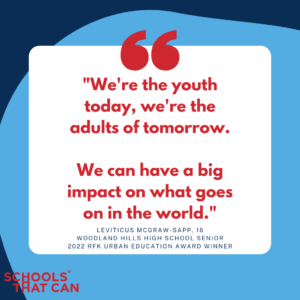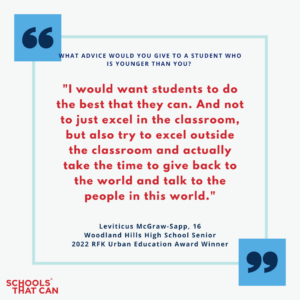Student Interview: Leviticus McGraw-Sapp
 Leviticus McGraw-Sapp, a sixteen-year-old rising senior at Woodland Hills High School in Pittsburgh, is busy. During his junior year, he was named to the National Honor Society, received a Challenge Program Certification for Community Service, and juggled extracurricular activities like Model United Nations, orchestra, and volunteering alongside work on climate change. This summer, Leviticus called Schools That Can in between his internship with the Hillman Cancer Center, working on cancer biology and non-small cell lung cancer, for which he had to write an abstract about research findings that was published, and meeting with the climate action team on weekends to prepare to host a workshop at a summit that’s coming up in the spring for Woodland Hills. He’s excited to get to speak on something he believes in, he said.
Leviticus McGraw-Sapp, a sixteen-year-old rising senior at Woodland Hills High School in Pittsburgh, is busy. During his junior year, he was named to the National Honor Society, received a Challenge Program Certification for Community Service, and juggled extracurricular activities like Model United Nations, orchestra, and volunteering alongside work on climate change. This summer, Leviticus called Schools That Can in between his internship with the Hillman Cancer Center, working on cancer biology and non-small cell lung cancer, for which he had to write an abstract about research findings that was published, and meeting with the climate action team on weekends to prepare to host a workshop at a summit that’s coming up in the spring for Woodland Hills. He’s excited to get to speak on something he believes in, he said.
Leviticus is also a winner of the 2022 RFK Urban Education Award, held in partnership with Robert F. Kennedy Human Rights and Schools That Can to honor extraordinary students, teachers, and school leaders in STC’s expansive network. Leviticus participated in STC’s career readiness programming through Woodland Hills, and this summer, we caught up with him to hear about what he’s looking forward to and the advice he’d give a young person thinking about their future.
What are you most looking forward to about school this year?
I’m looking forward to my senior year. And that after senior year, I’ll be going on to college. I’m actually looking forward to the college application process and applying for different scholarships. Right now, I have two majors and minors: I want to major in pre-med and chemistry, and minor in psychology and Spanish.
Did you have a favorite part of STC’s career readiness program?
One of my favorite parts was when Ms. Bryn Simpson was telling us about LinkedIn–she put [up] a post on the website, and it was a guy who I believe had a disability. She was talking about how he went on LinkedIn, and he was being very concise and just upfront in his letter that he posted. He got a lot of remarks on his letter–a lot of big name business people saying, I really admire your work and what you’re doing.
I would say I learned the most from when she presented about how businesses–though they look for soft traits such as leadership and communication–they also, at times, look for those more specific and niche traits, such as those critical thinking skills in math or having a heavy background in science.
You were a 2022 winner of the RFK Award. What did winning that award mean to you?
I have volunteered and done lots of humanitarian work over the course of my life. Ever since I was probably [in] third grade, I’ve been volunteering. I’m just always an avid learner in school and put my best foot forward. So winning that award was this combination of all these things–[…] a tangible embodiment of the work that I’ve done, and showing that what I’ve done over those years, and what I will continue to do, isn’t just for nothing. It actually has a meaning and it symbolizes something. That award is a visible representation of that work.
What inspired you to begin volunteering when you were younger?
I would have to tie it back to my mother and my grandmother. They would always be on me–they were always telling me that they want me to have a foot ahead, and they want me to know what I want to do when I’m older. They want me to be aware of my surroundings and what’s going on. And to never forget where I came from. Never forgetting where I came from is what sparked me to want to give back to my community that’s done so much for me, and they give to me.
What’s something you wish older adults knew about how it feels to be a young person making your way in the world right now?
I want them to understand that, despite us being the youth and despite us being younger, we still should have a voice in what goes on. For example, my work with climate change, we always talk about how when people think about climate change, sometimes [it’s the] politics point of view, congressmen or officials in the law can make changes in regards to climate change. Whereas us youth we’re talking and we’re trying to help be a part of that change. We’re the youth today, we’re the adults of tomorrow, and us being educated on these topics–we can have a big impact on what goes on in the world, and the roles that we play can help to elicit that change, and better the future.
What’s one piece of advice you’d give to a student who is younger than you? 
Two perspectives on this question: In general, I would say I would want students to do the best that they can. And not to just excel in the classroom, but also try to excel outside the classroom and actually take the time to give back to the world and talk to the people in this world. Gain a different perspective on life than what they have themselves.
From a Woodland Hills standpoint, I would say to challenge themselves and be the best at Woodland Hills right now. I want them to challenge students and to sign up for those AP classes so that we can keep them functioning and running for students to come in; for students that are here now.




